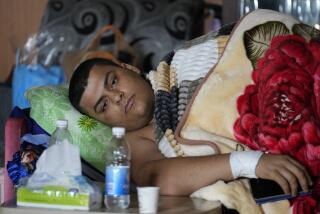Iraq Politicians Seek Talks Between Sects
- Share via
BAGHDAD — Iraqi lawmakers scrambled Thursday to maintain their relevancy, calling for a series of meetings between leaders of rival Shiite and Sunni Arab groups whose gunmen hold sway over the streets.
The elected officials want religious leaders of the main Sunni political groups and militiamen loyal to radical Shiite cleric Muqtada Sadr to settle their differences. Sadr’s militia has been blamed for a series of revenge attacks against Sunni civilians, often after Sunni insurgent bombings of Shiite religious sites.
Lawmakers inside the heavily fortified Green Zone also held a closed session of parliament Thursday, grilling the defense and interior ministers, who said they were hamstrung by poor intelligence, inferior equipment and communication problems when trying to halt attacks such as the execution-style slayings Sunday of about three dozen Sunnis, allegedly by Shiite militiamen in the Jihad neighborhood here.
“By the time they coordinate with [U.S.] forces and start to react to an incident, the [assailants] have already vanished and moved to another place,” Mahmoud Othman, a Kurdish member of parliament, told reporters after the closed session.
Defense and interior officials told lawmakers that a monthlong security effort to take control of the capital was in its first phase, consisting chiefly of increased checkpoints, lawmakers said after the session. Subsequent phases will include neighborhood raids and other offensive operations, the officials said.
The officials said they would reevaluate the jobs of ranking security officials who are deemed corrupt.
Sectarian and insurgent violence continued Thursday across the nation, with at least 28 Iraqis and a U.S. sailor reported killed.
In what has become almost a daily occurrence, gunmen at an illegal checkpoint ordered a group of seven Shiites out of their minibus on the southern outskirts of Baghdad, blindfolded them, walked them to a nearby riverbank and shot them through the back of the head at close range.
One victim was a 12-year-old boy.
A hospital official reported the discovery of at least four additional bodies in and around south and west Baghdad.
A suicide bombing outside a local government building northeast of Baghdad left six police officers dead, and gunmen killed a police colonel on the road between the capital and Baqubah, to the northeast.
Explosions killed seven Iraqis in the northern cities of Kirkuk and Mosul.
Four Shiite police officers were shot to death a day earlier while traveling through the volatile Dora district in southern Baghdad, authorities said Thursday.
The Iraqi Islamic Party, the main Sunni political bloc, issued a statement saying that “well-known militias,” a reference to Sadr’s Al Mahdi army, had taken over the last two Sunni mosques in the capital’s mostly Shiite neighborhood of Sadr City and booted the clerics out of their homes.
Sadr’s movement has been accused by U.S. and Iraqi officials of fueling the violence in Iraq. Before going into the closed session, the defense minister told lawmakers it was wrong to blame the country’s problems on militias.
“We have to deal with [the security situation] politically more than militarily,” said Gen. Abdul-Qader Mohammed Jassim Mifarji. “There are extremists on both sides.”
Sadr’s father and uncle, both ayatollahs based in Najaf, were executed by Saddam Hussein’s Sunni-dominated government. Hussein’s security forces killed tens of thousands of Shiites in the south after a failed 1991 uprising just after the Persian Gulf War, resulting in a sectarian rift that has yet to heal.
Lawmakers called on the religious and political leaders among Sunnis and Sadr’s followers to discuss their differences.
“I think it will help soothe tensions,” parliament speaker Mahmoud Mashadani told reporters. “Without transparency we can’t reconcile with each other.”
Elsewhere in Iraq, two U.S. pilots walked away unhurt from the crash Thursday afternoon of an AH-64D Apache Longbow helicopter south of the capital, the military said. The pilots were rescued within 10 minutes by a passing U.S. helicopter.
The slain sailor, assigned to the 9th Naval Construction Regiment, “died due to enemy action while operating in Al Anbar province” Wednesday, according to a news release.
On Thursday, U.S. and Iraqi officials formally handed over the peaceful and sparsely populated Shiite-dominated Muthanna province to the authority of Iraqi forces, in what the U.S. Embassy called “progress toward self-governance.”
The U.S. said it would contribute $10 million to improve the quality of life for the population of 550,000, where contingents of British, Australian and Japanese troops have been stationed.
“You should be proud that the history of Iraq will register that the first step to hand over security happened in your city,” Prime Minister Nouri Maliki told residents of Samawah, the provincial capital, according to a translation of his remarks.
The Iraqi army also took over security duties in the religiously mixed Turkmen city of Tall Afar, in Nineveh province to the north.
*
Times staff writer Suhail Ahmad in Baghdad and special correspondents in Baghdad, Baqubah, Kirkuk and Mosul contributed to this report.
More to Read
Sign up for Essential California
The most important California stories and recommendations in your inbox every morning.
You may occasionally receive promotional content from the Los Angeles Times.









